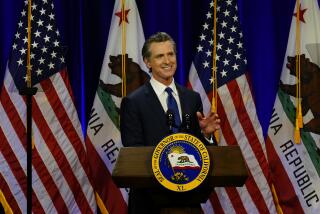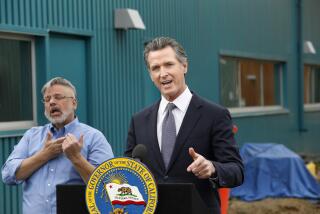Newsom’s other COVID-19 recall vulnerability: California’s broken unemployment system

SACRAMENTO — Nearly a year after a “strike team” appointed by Gov. Gavin Newsom recommended an overhaul of California’s unemployment benefits system, hundreds of thousands of jobless residents continue to experience delays in getting payments and the state is still grappling with the loss of billions of dollars to fraud.
And while the state Employment Development Department has made some progress in adopting change, the festering problems have become a leading issue for the campaign seeking to recall Newsom from office on Sept. 14.
Newsom’s record on the EDD has been attacked in campaign ads and public speeches by activists who put the recall on the ballot and by Republican candidates seeking to replace him as governor. The agency’s problems are listed as a primary reason to recall Newsom in the official ballot statement submitted by leading recall proponent Orrin Heatlie, a retired Yolo County sheriff’s sergeant.
“Newsom’s Employment Development Department spent over $30 billion in fraudulent payments to criminals and prison inmates, while forcing hundreds of thousands of struggling, out-of-work Californians to wait months for their money,” Heatlie wrote.
At the same time, some unemployed Californians who have dealt with the agency say that their bad experiences are likely to inform their vote.
“It’s a potential vulnerability and it comes under the heading of whether or not he is doing a good job,” said Darry Sragow, a veteran Democratic political strategist and publisher of the California Target Book, a guide to state politics and elections.
Millions of Californians were thrown out of work starting in March 2020 when state restrictions on business operations and public gatherings forced many businesses to shut down as people stayed home.
The EDD was quickly overwhelmed and paid $164 billion in benefits after being flooded with 23.6 million claims for assistance since the start of the pandemic. Those who lost jobs found an EDD with problems that had hampered the agency for years including antiquated technology and insufficient staff, resulting in computer glitches that prevented people from filing and following up on claims, as well as hours-long waits on the phone in efforts that too often failed to reach an agency representative for help.
In the early days of the COVID-19 pandemic, Newsom said he was not satisfied with the performance of the EDD. But he complained that he inherited an agency that had failed to modernize and prepare for a major event such as the pandemic.
In July 2020, the governor appointed the strike team of government efficiency experts that two months later recommended an overhaul of the agency and its operations.
“Unprecedented demand due to job loss during this pandemic paired with an antiquated system have created an unacceptable backlog of claims,” Newsom said at the time. “Californians deserve better, and these reform efforts aim to move the department in that direction.”
The agency says it has completed implementation of just over half of the recommendations made by the strike team in September 2020. It has put in place an identity verification system to help screen out fraud, expanded the use of automated systems to process claims and provided people calling by phone with alternative ways of getting their questions answered, including chat bots and text messages.
Representatives for EDD said it is still working to get all mail to a document management center each day, initiate quality controls, track appeal decisions and complete updates to the call center system.
The agency brought in thousands of mostly temporary workers to help answer phones and eliminated an initial backlog of 1.5 million claims facing delays.
But problems have persisted. As of July 31, there was a backlog of 216,000 claims that had not been approved within 21 days. The week ending on that date saw the EDD receive 3.4 million calls — it was able to answer only 248,000 of them.
And 14% of new claims still require some manual processing.
The nonprofit Center for Workers’ Rights gets an average of 40 calls a day from people still needing help with their unemployment claims, Executive Director Daniela Urban said.
“New claimants are still facing long waits,” she said, adding that people whose claims are wrongly rejected by EDD have not been able to get swift action on their appeals.
“We’re at over a 100-day delay in getting those hearings,” Urban said.
Some jobless Californians say the EDD‘s failures have left them on the brink financially. It has affected how they view the recall election, they said.
Tonice Jones, a Los Angeles-area resident, paid $20 to a private service to help get her unemployment claim resolved with EDD after her benefits were delayed by weeks, and she spent hours on the phone trying to get through to the agency.
“I feel it’s absolutely absurd I had to pay to get help,” said Jones, who worked in marketing for a gym before the pandemic. “This process has been a nightmare.”
Asked about the recall, Jones, an independent, said: “This experience has definitely reduced my support for Newsom moving forward.”
Logan Powell, a Democrat from Barstow, said he is undecided on the recall, but his bad experience with EDD has created doubt about whether he will vote to keep Newsom in office.
“It has made me a little hesitant,” said Powell, who was a sales clerk at a gas station before the pandemic and has seen his claim for unemployment benefits delayed more than 10 weeks.
Lisa Pitsenbarger, a home healthcare worker from Orange, has been waiting for benefits since May.
“Trying to get through on the phone is just horrendous,” she said.
Pitsenbarger said she didn’t vote for Newsom in 2018, and her experience with EDD has only added to her resolve to vote in favor of the recall.
“He’s in charge and he’s had all this time to work this out and doesn’t do anything,” Pitsenbarger said.
The EDD has also faced criticism for not doing enough to stop fraud. The agency determined at least $11 billion in benefits were paid on fraudulent claims, many in the names of state prison inmates, including convicted killers on death row. An additional $19 billion in benefits have been identified as suspicious and are under investigation.
State Auditor Elaine Howle issued two reports in January that blamed insufficient planning by state officials for the agency‘s lack of preparedness with regard to the pandemic workload and said California officials failed for months to heed warnings of widespread claims fraud.
Half a year later, the auditor’s office says only five of her 26 recommendations have been fully implemented.
In response to the problem, the EDD began late last year to check unemployment claims against the personal information of prison inmates, something 35 other states had already been doing. It also hired a firm to verify the identity of claimants by methods including video calls.
In November, Newsom announced the formation of a task force with federal prosecutors and county district attorneys to investigate fraud. But given the scope of the task, while hundreds of people have been arrested, the state paid benefits on tens of thousands of fraudulent claims.
Last month , the Newsom administration named former federal prosecutor McGregor Scott to serve as special counsel to assist in the investigations. Newsom did not comment on the announcement, which was made by Rita Saenz, whom the governor appointed as EDD director in December.
Critics have also noted that the governor avoided a discussion of serious problems at the EDD during his annual State of the State address in March, when he spoke for half an hour on pressing challenges facing the state.
The governor has also been mostly quiet on the EDD problems in recent months, which might be a good strategy, Sragow said.
“It’s not something you want to defense by drawing attention to it,” he said. “You’ve got to acknowledge it, cover yourself on it, and be sure that when the hit comes that you are able to tell a story that it wasn’t your fault and you are on top of it and you are dealing with it.”
That has been the message of the governor’s office throughout the pandemic.
Newsom’s last substantive comments on the EDD came in May when he announced a revised budget that included allocating $342.9 million over two years to improve the EDD. The budget included an expansion of its workforce, technology upgrades and a plan to allow benefits to be directly deposited into bank accounts to reduce fraud associated with the debit cards currently used.
“We are making a big, bold commitment in terms of benefits management upgrades and addressing issues of language access in this budget proposal,” Newsom told reporters in May.
The governor emphasized that the problems at the EDD have also been experienced by unemployment agencies in other states grappling with record numbers of jobless claims.
“It was just not designed for the challenge that this nation, this state has faced so we have to reimagine it, we have to support it,” Newsom said of the agency at the time.
Candidates seeking to replace Newsom say he has not done enough, and they are offering their own plans.
Conservative radio talk show host Larry Elder, who leads in the polls, says he would replace the EDD’s antiquated information technology systems so that all claims could be processed automatically. Many are currently processed by hand. Elder said he also would never have suspended the safeguards that require a determination of eligibility before claims are paid.
“It is a disgrace that Gavin Newsom’s draconian coronavirus restrictions forced Californians out of their jobs and homes, while the EDD paid up to $31 billion to fraudsters and criminals,” Elder said in a statement.
Former San Diego Mayor Kevin Faulconer, another Republican candidate, says he would make the EDD the state’s top priority technology project.
“Under Gavin Newsom, incompetence has festered in the Employment Development Department,” Faulconer says on his website.
Other candidates weighed in on the agency during a recent debate at the Richard Nixon Presidential Library and Museum in Yorba Linda.
Republican candidate John Cox, who ran for governor in 2018, promised change at the top of the EDD.
“That management should go,” he said.
And Republican Assemblyman Kevin Kiley, another candidate to replace Newsom, noted he was co-author of a package of bills to reform the agency, including a measure to end the inclusion of Social Security numbers in EDD mail.
“Unfortunately, Governor Newsom failed to act with any sense of urgency,” the Rocklin lawmaker said. “He refused to prioritize EDD reforms in his `historic state budget, choosing instead to put Band-Aids on a broken system.”
Meanwhile, more turmoil is coming Sept. 4, just before recall election day. That is when federal supplemental benefits are scheduled to end, leaving many California gig workers and independent contractors without financial help to which they have become accustomed, Urban said.
“The end of the benefits program is going to cause a lot of distress for claimants if they don’t have new work,” Urban said. But, she added, “it will give EDD some breathing room.”
More to Read
Sign up for Essential California
The most important California stories and recommendations in your inbox every morning.
You may occasionally receive promotional content from the Los Angeles Times.











